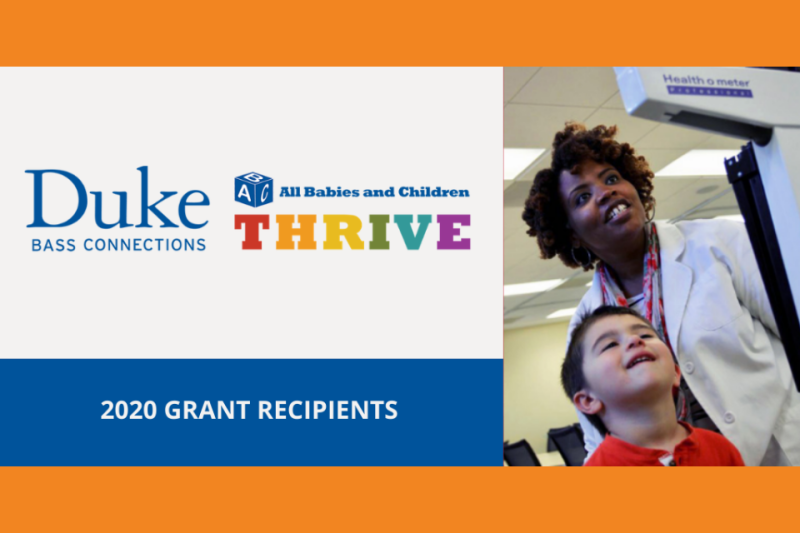
All Babies and Children Thrive (ABC Thrive) has awarded seed grants of up to $40,000 to four interdisciplinary teams of Duke faculty. The teams will explore new interventions to support positive early childhood development ranging from tools for earlier identification of children at risk for neurodevelopmental challenges, to methods for teaching young children prosocial behaviors, to improving outcomes for black children and families through early care interventions and new teaching methods.
At the end of a successful pilot project, these teams will be eligible to compete for a larger award of up to $300,000 over two years.
Duke Psychiatry & Behavioral Sciences faculty members are co-leading two of the teams:
Behavioral Insights and Engagement Among Black Families in Family Connects Durham
Faculty leaders: Karen Carmody, PhD, Psychiatry & Behavioral Sciences; Lisa Gennetian, PhD, Sanford School of Public Policy
Providing new parents with evidence-based, culturally relevant support postpartum has been proven to strengthen parents’ capacity to support their children’s health and development and potentially reduce socioeconomic and racial/ethnic disparities later in life. Family Connects Durham (FCD), a postpartum home visiting program administered by the Center for Child and Family Health, offers all Durham families a free nurse home visit about three weeks after the birth of a child. In randomized trials, FCD demonstrated improved service connections, higher-quality parenting, lower maternal anxiety, and reduced emergency medical care and child protective service investigations. However, Black families are far less likely than white families to schedule and complete a home visit.
This project will apply insights from behavioral economics to design and pilot new strategies to increase participation and subsequent behavioral change among Black families. Using the behavioral economics framework, researchers will seek to understand the sequence of interrelated decisions that families in the program make, in order to design new interventions to improve parent engagement.
From Data Science to Clinical Care: Optimizing Predictive Models to Improve Child Neurodevelopment
Faculty leaders: Richard Chung, MD, Pediatrics; Scott Kollins, PhD, Psychiatry & Behavioral Sciences
Early identification and intervention for neurodevelopment disorders, like Autism Spectrum Disorder (ASD) and Attention Deficit Hyperactivity Disorder (ADHD), can significantly improve outcomes. However, screening for ASD and ADHD is not currently well integrated into routine pediatric primary care, limiting opportunities for early and effective intervention.
This project seeks to use predictive data models to identify risk for neurodevelopmental challenges earlier and more efficiently, effectively communicate this risk to relevant stakeholders, and develop scalable interventions to reduce risk. If successful, this study has the potential to reduce risk and burden related to neurodevelopmental disorders across the population, including children of color who are at particular risk for late diagnosis and delayed intervention.
Other Duke Psychiatry & Behavioral Science team members include:
- Geraldine Dawson, PhD
- Matthew Engelhard, PhD
- Elsa Friis, PhD
- Gary Maslow, MD, MPH
This article was adapted from the original Bass Connections at Duke announcement of the seed grants. Visit the Bass Connections at Duke website to learn more about these projects and the other two ABC Thrive projects.